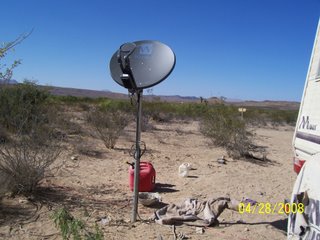
2007 was a rough year for me. I was living off student loans, trying desperately to finish my degree in time to look for a teaching job at the start of the school year. I managed to find a job within a month of graduating, which was a lucky break, only to find out my school district would be paying me monthly, on the last day of the following month. My only consolation was that I managed to avoid the scourge of post-graduation unemployment, but before the school year was over, I was back on a collision course with the Florida unemployment system, thanks in part to the voters of my state.
In November of last year, the principal of my high school announced that his nightmares had come true, that Florida voters had passed a ballot initiative that increased the Homestead Exemption. I'd been teaching for only a few months, but I'd been made to understand by the other teachers that whenever the voters passed anything that would cut their taxes by a few hundred dollars, it cut the state budget by that same hundred dollars multiplied by millions of Florida tax-payers. That meant budget shortfalls for the every department of state government, including the Polk County School Board, which employed me as an English teacher. Within a few months, the principal told me what I'd already come to suspect. A first year teacher hired a month into the school year was at the bottom of the seniority totem pole, and I was one of the unlucky teachers whose units had been excised to cover the budget shortfall.
When the school year ended, I cleaned out my classroom, a portable trailer that was going to be condemned because of bad wiring only days after I left it, and I started looking for work. After a month or two without leads, I turned to the unemployment system.
I'd been dreading applying for unemployment benefits for a while because I figured it would be a long, horrifying process under hot lights, in the back room of some government office with Soviet-style bread lines out front. As it turned out, I didn't even need to wear pants to apply for benefits. In Florida, you can enter all your information into a government website and apply online. You can even enter your banking information and have the unemployment checks deposited directly into your account. I took note of when I was supposed to come back to the site and claim my weeks, entered my direct deposit information, and felt generally embarrassed that I'd worried about filing for unemployment in the first place.
You can't collect anything for at least two weeks, and there's a one week waiting period after that. This probably varies by state, but most people agree that you won't see any actual money for a month after applying.
While I was waiting, the state mailed me the first of several helpful updates about my unemployment claim, a sheet reminding me to claim my weeks on the appointed day, 8/19/08, through either www.fluidnow.com or by calling the toll-free number. It also explained in bold print that failing to claim my weeks would delay my benefits.
The next piece of correspondence I received was something labeled, “Wage Transcript and Determination,” which I correctly deduced had to do with how much I would be receiving from unemployment. At the bottom of the sheet, it listed my wage credits, and somewhere in the middle of a very misleading chart, it showed my eligibility, which they had rather curiously noted by putting an X under a box that said, “Insufficient Wage Credits.” That was the only hint that I would be receiving no benefits, as I received another letter a few days later which again reminded me to claim my weeks. The Wage Determination report itself was generic and poorly laid out, with its Ineligible and Eligible boxes side by side in such a way that I couldn't tell at first glance which one applied to me.
When I claimed my weeks on the appointed day and received nothing that week or the week that followed, I went back to that form and started to wonder if I'd misread it, which I clearly had. Maybe I'd seen the X under “Insufficient Wage Credits” and my subconscious had dismissed it as a mistake. I mean, it was ridiculous to think that my sister, who'd spent a few months working for an ice cream shop in Daytona, could collect unemployment benefits but teaching high school for a year wasn't worth sufficient wage credits.
Granted, her former employer had challenged her claim on the grounds that she'd been fired. My sister further clarified that she'd been fired because she left work to fly to New Jersey for our aunt's funeral and the manager had refused to give her the time off. She was awarded the benefits.
I called the number furnished by the Agency for Workforce Innovation, who was apparently responsible for administrating the unemployment program, but kept getting busy signals. I checked the documentation provided on the state's website to see if I could find out exactly why I didn't qualify for benefits.
From the Agency for Workforce Innovation:
Some of the reasons a person may be denied benefits are as follows:
- Quitting either part-time or full-time work for personal reasons. Benefit payments can only be paid if you quit for good cause attributable to your employer, or for a personal illness or disability that made it necessary for you to leave the job.
- Being discharged for misconduct connected with work. Misconduct is an intentional or controllable act or failure to take action, which shows a deliberate disregard of the employer’s interests. Misconduct may include breaking a known company policy.
- Not being able to work or available for work. You must be able, ready and willing to accept a suitable job immediately. You must also be able to get to work and have adequate child care in order to be able to work.
- Refusing an offer of suitable work.
- Being on a leave of absence you requested.
- Knowingly making false statements to obtain benefit payments.
I wasn't fired, and I'd worked almost a full school year earning around $15/hour. The unemployment system was being run by the state. I'd been employed by the state. Everything I said about my employment history was easily verified, right down to the budget cut that put me out of work.
�¢ If your claim is not payable, the determination will explain the reason for denial and your appeal rights.
“Explain” here having the rather liberal definition of, “A box will be checked somewhere on a nondescript form, which you will then be left to interpret.” If this was because I hadn't accumulated enough wage credits, it would have been nice to know exactly how many I needed and how I was supposed to go about getting them. I turned to that bastion of knowledge, the Frequently Asked Questions link:
To qualify monetarily, a person must:
Have been paid wages in two or more calendar quarters in the base period;
Have total base period wages of at least 1-1/2 times the wages in the quarter having the highest earnings; Have at least $3,400 total wages in the base period.
Looking at my Determination, I had clearly earned more than $3,400 in the base period. It also showed that I had earned wages in two of the four listed quarters, though something was definitely off there. The four quarters were listed on my chart as 2/07, 3/07, 4/07, and 1/08, which seemed to suggest several quarters were only thirty days long and the last of them lasted from April all the way to the end of the year. I was an English teacher, but even I know how to divide a year into quarters.
The middle requirement, in which I needed to earn 1-1/2 times the wages of my highest quarter might be what they were counting against me, but based on how they were measuring their quarters, I couldn't be sure. In fact, what they listed for my earnings in the last quarter was only a fraction of what I actually earned, almost as though they'd carved off an entire portion of my 2008 earnings when they divvied the year into one-month or eight-month slices. It's very hard to make 1-1/2 times the total when one quarter doesn't even reflect half of what you actually earned.
I tried getting to the bottom of this again today, first checking the website for any information on my claim, and then calling the toll-free number. The website wasn't helpful, but it did tell me that there was an ongoing problem with the Internet Claims System and that I should call the Agency directly at the listed number. As before, the line was busy, but after an hour or so I managed to get through. An automated voice warned me that the call volume was higher than normal and that it might be an hour before someone could speak to me. It helpfully suggested using the Internet Claims System, then asked me to choose from a list of options. I chose the one that would connect me with an agent, fully prepared to wait however long it took to get some answers.
The automated voice warned again that the Agency was experiencing higher than normal call volume, then said, “There are no representatives available. Please call back later if you would like to speak to a representative.” The automated voice repeated this strange pronouncement a second, and then a third time, “There are no representatives available,” and then it terminated my call.
Apparently, the budget shortfall hit some departments harder than others.
Labels: economy, Edible_Consumer, florida, teacher, unemployment_benefits
 I am a rare and endangered species in America - I am Black, and I am not voting for Obama.
I am a rare and endangered species in America - I am Black, and I am not voting for Obama.






